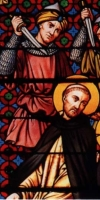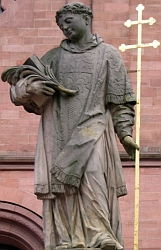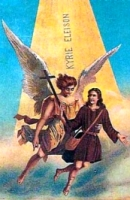Saint Erasmus
ஃபோர்மியா நகர் புனிதர் எராஸ்மஸ்
மறைசாட்சி, ஃபோர்மியா ஆயர்:
பிறப்பு: 3ம் நூற்றாண்டு
இறப்பு: கி.பி 303
இல்லரிகம் (நவீனகால குரோஷியா)
ஏற்கும் சமயம்:
ரோமன் கத்தோலிக்க திருச்சபை
கிழக்கு மரபுவழி திருச்சபை
நினைவுத் திருநாள்: ஜூன் 2
பாதுகாவல்:
குடல் அழற்சிக்கு எதிராக, பிறப்பு வலிக்கு எதிராக, வயிற்று வலி மற்றும் நோய்களுக்கு எதிராக, குடல் வாயு அல்லது குடலில் அடைப்பு ஏற்படுவதால் அடிவயிற்றில் கடுமையான, பெரும்பாலும் ஏற்ற இறக்கமான வலிக்கு எதிராக, கடலில் ஏற்படும் ஆபத்துக்கு எதிராக, கடல் நோய்களுக்கு எதிராக, புயல்களுக்கு எதிராக, வெடிமருந்துகள், வெடிபொருட்கள் மற்றும் துப்பாக்கித் தொழிலாளர்கள், படகோட்டிகள், கடற்படையினர், மாலுமிகள், பிரசவம் மற்றும் பிரசவத்தில் உள்ள பெண்கள், வழிகாட்டிகள், கேட்டா (Gaeta), இத்தாலி (Italy), ஃபார்மியா (Formia), கால்நடை பூச்சி (Cattle pest), செயின்ட் எல்மோ கோட்டை (Fort St. Elmo), மால்டா (Malta).
புனிதர் "எல்மோ" (Saint Elmo) என்றும் அழைக்கப்படும் ஃபார்மியா நகர் புனிதர் எராஸ்மஸ் (Erasmus of Formia), கி.பி. 303ம் ஆண்டு மரித்த, ஒரு கிறிஸ்தவ துறவியும், மற்றும் மறைசாட்சியும் ஆவார். எராஸ்மஸ் அல்லது எல்மோ, பதினான்கு தூய உதவியாளர்கள் (Fourteen Holy Helpers) என்றழைக்கப்படும் புனிதர்களுள் ஒருவர் ஆவார். கிறிஸ்தவ பாரம்பரியத்தின்படி, இப்புனிதர்கள், பிறரின் செப பரிந்துரையாளர்களாக வணங்கப்படுகிறார்கள்.
வாழ்க்கையின் ஆவணம்:
புனிதர் எராஸ்மஸின் நடவடிக்கைகள், ஓரளவு புராணக்கதைகளிலிருந்து தொகுக்கப்பட்டவை ஆகும். அவை அந்தியோக்கியாவின் சிரிய ஆயர் (Syrian bishop), அந்தியோக்கியாவின் எராஸ்மஸுடன் (Erasmus of Antioch) குழப்பமடைகின்றன. பொற்கால புராணங்களின்படி, ஜேக்கபஸ் டி வோராகின் (Jacobus de Voragine) அவரை அனைத்து இத்தாலிய காம்பானியா (Italian Campania) மீதும், ஃபார்மியாவின் ஆயராககவும் (Bishop at Formia), லெபனான் மலையில் (Mount Lebanon) ஒரு துறவியாகவும் (Hermit), கிழக்கு ரோமானிய பேரரசர் (Eastern Roman Emperor) டயோக்லேஷியனின் (Diocletian) ஆட்சியின்கீழ் நடந்த கிறிஸ்தவ துன்புறுத்தல்களின் ஒரு மறைசாட்சியாகவும் புகழ்ந்தார். அவரது ஆர்வத்திற்கு வரலாற்று அடிப்படை எதுவும் இல்லை என்று தெரிகிறது.
வாழ்க்கை மற்றும் மறைசாட்சியம்:
எராஸ்மஸ், இத்தாலி (Italy) நாட்டின் ஃபோர்மியா நகர் (Bishop of Formia) ஆயராக இருந்தார். பேரரசர்களான டயோக்லேஷியன் (Diocletian) (கி.பி. 284-305) மற்றும் மாக்சிமியன் ஹெர்குலஸ் (Maximian Hercules) (கி.பி. 284-305) ஆகியோரின் ஆட்சி காலத்தில் நடந்த கிறிஸ்தவர்களுக்கு எதிரான துன்புறுத்தலின்போது, அவர் தனது மறைமாவட்டத்தை விட்டு வெளியேறி லெபனான் மலைக்குச் (Mount Lebanon) சென்றார். அங்கு அவர் ஏழு ஆண்டுகள் ஒளிந்து வாழ்ந்தார். இருப்பினும், ஒரு தேவதூதர் அவருக்குத் தோன்றி, அவரை அவரது நகரத்திற்குத் திரும்பும்படி அறிவுரை வழங்கியதாக கூறப்படுகிறது.
தமது ஊர் திரும்பும் வழியில் குறுக்கிட்ட சில வீரர்கள், அவரிடம் கேள்விகள் எழுப்பி அவரை விசாரித்தனர். எராஸ்மஸ், தாம் ஒரு கிறிஸ்தவர் என்று ஒப்புக் கொண்டார். மேலும் அவர்கள் அவரை அந்தியோகியாவில் (Antioch) பேரரசர் டயோக்லேஷியன் (Diocletian) முன் விசாரணைக்கு கொண்டு வந்து நிறுத்தினார்கள். அவரை பயங்கரமான சித்திரவதைகளுக்கு உள்ளாக்கிய அவர்கள், பிறகு அவரை சங்கிலிகளால் பிணைத்து, சிறையில் தள்ளினார்கள். ஆனால் ஒரு தேவதை தோன்றி அவர் அங்கிருந்து தப்பிக்க உதவியது.
கரியா (Caria) மற்றும் பம்பிலியா (Pamphylia) இடையே தென்மேற்கு ஆசியா மைனரின் (Southwestern Asia Minor) கடற்கரையில் ஒரு பண்டைய பகுதியான லைசியா (Lycia) வழியாக எராஸ்மஸ் பயணித்தார். அங்கு அவர், சிறப்புமிக்க குடிமகன் ஒருவரின் மகனை வளர்த்தார். இதன் விளைவாக, அநேக குடிமக்களுக்கு அவர் திருமுழுக்கு அளித்தார். இது மேற்கு ரோமானிய பேரரசர் (Western Roman Emperor) மாக்சிமியன் (Maximian) கவனத்தை ஈர்த்தது. வரலாற்றாசிரியர் வோராகின் (Voragine) என்பவரது கூற்றுப்படி, "பேரரசர் மாக்சிமியன், பேரரசர் டயோக்லேஷியனை விட மோசமானவர்" ஆவார். மாக்சிமியன் அவரை கைது செய்ய உத்தரவிட்டார். எராஸ்மஸ் தனது கிறிஸ்தவ விசுவாசத்தை தொடர்ந்து அறிக்கையிடார். அவர்கள் அவரை விக்கிரகங்களின் கோவிலுக்குச் செல்லும்படி கட்டாயப்படுத்தினர். ஆனால் எராஸ்மஸ் சென்ற பாதையில் அனைத்து சிலைகளும் விழுந்து அழிந்துபோயின. கோயிலில் இருந்த பல பாகன்கள் மீது தீ பற்றிக்கொண்டது.
இது சக்கரவர்த்திக்கு மிகவும் கோபத்தை ஏற்படுத்தியது. அவர் எராஸ்மஸை கூர்மையான ஈட்டிகள் நீட்டிக்கொண்டிருந்த ஒரு பீப்பாயில் அடைத்து வைத்தார். பீப்பாய் ஒரு மலையிலிருந்து உருட்டப்பட்டது. ஆனால் ஒரு தேவதை அவரை மீட்டு, குணமாக்கியது. மேலும் சித்திரவதைகள் தொடர்ந்தன.
அவர் மீண்டும் பிடிபட்டபோது, அவரை சக்கரவர்த்தியின் முன் அழைத்து வந்து நிறுத்தினார்கள். கசையால் அடித்து துன்புறுத்தினார்கள். ஆனால், அவர் இன்னும் உயிர் பிழைத்திருந்தார். அவரை பட்டினியால் இறக்க அனுமதிக்க வேண்டும் என்ற நோக்கத்துடன் அவரை சிறையில் தள்ளி, பட்டினி போட்டார்கள். இருப்பினும் எராஸ்மஸ் அதிலிருந்து தப்பிக்க முடிந்தது.
இறுதியாக, இல்லரிகம் (Illyricum) எனும் ரோமானிய மாகாணத்தில் (Roman province) அவர் மீண்டும் பிடிக்கப்பட்டு, சித்திரவதை செய்யப்பட்டார். ஆனால், அவர் மீண்டு மீண்டும் தைரியமாக பிரசங்கித்தார். பல பாகன்களை கிறிஸ்தவ மதத்திற்கு மாற்றிய பின்னர். இறுதியாக, அவரது மரணத்தின் இந்த பதிப்பின் படி, அவரது வயிறு கிழிக்கப்பட்டு, அவரது குடல்கள் வெளியே எடுக்கப்பட்டு, அவர் கொல்லப்பட்டார்.
வணக்கம் மற்றும் பாதுகாவல்:
அவருக்கு அருகில் ஒரு இடி தாக்கிய பிறகும், அவர் தொடர்ந்து பிரசங்கித்ததாகக் கூறப்படுகிறது. இது, திடீர் புயல் மற்றும் மின்னல் ஆகியவற்றால் ஆபத்தில் இருந்த மாலுமிகளை அவரது பிரார்த்தனைகளை கோர தூண்டியது. இதன் காரணமாகவே, எராஸ்மாஸ் மாலுமிகளின் பாதுகாவலர் ஆனார். கப்பல்களின் முகப்பில் உள்ள மின் வெளியேற்றங்கள் அவரது பாதுகாப்பின் அடையாளமாக வாசிக்கப்பட்டு "செயிண்ட் எல்மோ'ஸ் ஃபயர்" (Saint Elmo's Fire") என்று அழைக்கப்பட்டன.
Also known as
Elmo, Eramo, Erarmo, Ermo, Herasmus, Rasimus, Rasmus, Telmo
Profile
Bishop of Formiae, Campagna, Italy. He fled to Mount Lebanon in the persecutions of emperor Diocletian where he was fed by a raven so he could stay in hiding. Discovered by the authorities, he was imprisoned, but an angel rescued him. Recaptured, he was martyred. One of the Fourteen Holy Helpers. Namesake for the static electric discharge called Saint Elmo's Fire.
Died
disemboweled c.303 at Formiae, Italy
Patronage
• against appendicitis
• against birth pains
• against abdominal or stomach pains and diseases
• against colic
• against danger at sea
• against seasickness
• against storms
• ammunition, explosives and ordnance workers
• boatmen, mariners, sailors, watermen
• childbirth and women in labour
• navigators
• Gaeta, Italy
Representation
windlass
Saint Nicephorus of Constantinople
Also known as
Nikephoros
Profile
Son of the secretary to Emperor Constantine Copronymus, a man tortured and exiled for refusing to accept iconclasm. Nicephorus was known as a scholar and eloquent speaker, and served as an imperial commissioner. Built a monastery near the Black Sea. A layman, he was chosen patriarch of Constantinople in 806. When he gave absolution to the priest who had illicitly married Emperor Constantine VI and Theodota while Constantine's wife Mary was still alive, Nicephorus fell into conflict with Saint Theodore Studites, but the two later reconciled. Nicephorus worked for a return to monastic discipline, reform of the administration of the diocese, and evangelization of the lay people. Brought Saint Methodius of Constantinople from his monastery on Chios to help. Opposed Emperor Leo the Armenian's attempt to return to iconoclasm, and was deposed by a synod of iconoclastic bishops. Several attempts were made his life, and he was exiled to the monastery he had built on the Black Sea. He spent his final 15 years there, praying and writing history and treatises against iconoclasm.
Born
758 in Constantinople
Died
2 June 828 of natural causes
Works
• Breviarum
• Chronographia
Blessed Sadoc of Sandomierz
Also known as
Sadoch, Zadoc, Zadok
Profile
Studied at the University of Bologna, Italy. Dominican friar, receiving the habit from Saint Dominic de Guzman himself. At the General Chapter the Dominicans in Bologna in 1221, Sadoc was chosen to assist Master Paul of Hungary to establish a province in Hungary. Sadoc later moved on to Poland where he served as preacher for nearly forty years. In 1260 he and 48 Dominicans from Sandomierz were martyred by the Tartars as they were singing the Salve Regina at Compline; the custom of singing the Salve Regina at the deathbed of Dominicans stems from this incident.
Died
1260 at Sandomierz, Poland
Beatified
18 October 1807 by Pope Pius VII (cultus confirmation)
Saint Peter the Exorcist
Also known as
• Peter Exorcista
• Peter the Deacon
Profile
Exorcist in Rome, Italy. Helped convert Saint Artemius of Rome, Saint Candida of Rome, and Saint Paulina of Rome. Known for his piety and dedication to his work. Worked with and was martyred with Saint Marcellinus in the persecutions of Diocletian. His name is mentioned in the first Eucharistic prayer.
Born
imperial Roman citizen
Died
• 304 in the Silva Nigra just outside Rome, Italy
• buried in the Saints Marcellinus and Peter cemetery on the Lavican Road by Lucilla and Firmina
• Constantine built a basilica over their tomb
• relics later taken to Selgenstadt abbey by Einhard, Charlemagne's secretary
• skull enshrined in a reliquary in the Abbey of Saint Denis in 1665; reliquary melted and relics destroyed in 1794
புனித மார்சலினஸ்,புனித பீட்டர் (St.Marcelinas, St.Peter)
மார்சலினஸ் குருவாக திருநிலைப்படுத்தப்பட்டு, குருத்துவ நிலையை அடைந்தார். பீட்டர் திருச்சபை வழங்கும் "பேய்களை ஓட்டும்" அதிகாரம் பெற்றவராக தொண்டு புரிந்து வந்தார். இருவரும் தங்களின் வேத விசுவாசத்திற்காக சிறையில் தள்ளப்பட்டனர். அங்கு ஏற்கெனவே விசுவாசத்திற்கு எதிராக செயல்பட்டவர்கள் சிலர் கிறிஸ்தவர்களை விசுவாசத்தின்பேரில் கொடுமைப்படுத்தி வந்தனர். அவர்களை இவர்கள் இருவரும் மனந்திருப்பினர். அவர்களை கிறிஸ்துவின் விசுவாசிகளாக மாற்றினர். சிலரை புதிதாகவும் மனந்திருப்பினர். சிறைக் காவலன் ஆர்த்தியுஸ், அவர் மனைவி, மகள் ஆகியோர் கூட கிறிஸ்துவின் ஒளியை இவர்கள் மூலம் பெற்றுக்கொண்டனர்.
இவர்களின் வீரச்சாவு நாளன்று, நாயக்ரா என்றழைக்கப்படும் ஒரு காட்டிற்குள் கொண்டு போகப்பட்டனர். அங்கே இவர்கள் தலைகள் துண்டிக்கப்பட்டன. இவர்கள் வெட்டப்படும்முன் இவர்களை புதைக்க ஒரு குழித்தோண்டப்பட்டிருந்தது. உடனே இவர்கள் புதைக்கப்பட்டனர். இந்த இரகசியத்தை கொலைஞனே வெளிக்கொணர்ந்துவிட்டார். இவரும் இறுதியில் திருமுழுக்கு பெற்றுக்கொண்டார். லூசில்லா, ஃபிர்மினா என்ற பக்தியுள்ள பெண்கள் இவர்களின் புனித உடல்களை எடுத்து "திபூர்சியஸ் புதைக்குழி"யில் அடக்கம் செய்தனர். மன்னன் கான்ஸ்டாண்டின் கிறிஸ்துவின் ஒளியை பெற்றுக்கொண்டவர். இவர் கல்லறைமேல் பேராலயம் எழுப்பியதுடன், புனித எலேனா என்ற பெயர் கொண்ட தம் தாயையும் இங்கேயே அடக்கம் செய்தார். இவர்களின் வீரச்சாவு தொடக்கத் திருச்சபையில் எவ்வளவு போற்றப்பட்டதெனில் ரோமன் கேனன்(Roman Canon) என்று சொல்லப்படும். திருப்பலி வேளையில் பயன்படுத்தப்படும் "மாறாத ஜெபங்கள்" என்ற பகுதியில் இவர்களின் பெயர்கள் சேர்க்கப்பட்டு காலங்காலமாக நினைவு கூரப்பட்டனர்.
"நாம் வெறும் மனிதர்களோடு போராடுவதில்லை. வான் வெளியில் திரியும் தீய ஆவிகளோடு போராடுகிறோம், எனவே பொல்லாத நாள் வரும்போது, எதிர்த்து நின்று அனைத்தின்மீது வெற்றி அடைந்து, நிலை நிற்க வலிமை பெறும்படி கடவுள் தரும் படைக்கலங்களை எடுத்துக்கொள்ளுங்கள்" (எபே 6:12) என்ற இறைவாக்கை வாழ்வாக வாழ்ந்தனர்.
Saint Marcellinus
Profile
Priest in Rome, Italy. Noted for his piety. Martyred with Saint Peter the Exorcist in the persecutions of Diocletian. His name is mentioned in the first Eucharistic prayer.
Born
Roman citizen
Died
• 304 in the Silva Nigra just outside Rome, Italy
• buried in the Saints Marcellinus and Peter cemetery on the Lavican Road by Lucilla and Firmina
• Constantine built a basilica over their tomb
• relics later taken to Selgenstadt abbey by Einhard, Charlemagne's secretary
Representation
one of two priests standing together and holding palms of martyrdom
Blessed Guido of Acqui
Also known as
Guisto, Guy, Vido, Wido
Profile
Born to the nobility; his father was the Count of Acquesana. Educated in Bologna, Italy. Bishop of Acqui, Monteferrato, Piedmont, Italy in March 1034 till his death 36 years later. Noted reformer, and remembered for his charity; he used much of his own wealth to support the local economy and end corruption. Promoted the education of women. Founded the convent of Santa Maria de Campis.
Born
c.1004
Died
• 2 June 1070 of natural causes
• interred in the cathedral of Saint Guisto, Susa, Italy
Beatified
1853 Pope Blessed Pius IX (cultus confirmed)
Patronage
• against famine
• diocese of Acqui, Italy
• Acqui Terme, Italy
Saint Nicholas Peregrinus
Also known as
• Nicholas the Pilgrim
• Nicola Pellegrino di Trani
Profile
Moved from Greece to Apulia, Italy as a teenager where he wandered the streets carrying a cross and crying "Kyrie Eleison" ("Lord, have mercy"). Groups of children would follow him, also crying "Kyrie Eleison". Noted for his piety and personal holiness, but considered a lunatic by the locals. Many miracles reported at his tomb.
Born
1075 in Greece
Died
1094 in Trani, Italy of natural causes
Canonized
1098 by Pope Blessed Urban II
Patronage
Trani, Italy
Saint Blandina the Slave
Also known as
Blandina of Lyon
Profile
Slave. With several others, she was set upon by a pagan mob, arrested, tried and convicted of the crime of Christianity, along with a number of nonsense charges like cannibalism, during the persecutions of Emperor Marcus Aurelius. One of the Martyrs of Lyon and Vienne.
Died
• enmeshed in a net and given to a wild bull in 177 at Lyon (in modern France)
• body burned and the ashes thrown in the river
• what could be recovered is in the church of Saint-Leu, Amiens, France
Patronage
• falsely accused people
• girls
• torture victims
• Lyon, France
Saint Daminh Ninh
Also known as
• Domenic Ninh
• Dominic Ninh
Additional Memorial
24 November as one of the Martyrs of Vietnam
Profile
Christian peasant farmer in the apostolic vicariate of Central Tonkin (modern Vietnam). During the persecutions of emperor Tu-Duc, he was ordered to step on a crucifix to show his contempt for Christianity; he refused. Imprisoned, tortured and executed. Martyr.
Born
c.1835 in Trung Linh, Nam Dinh, Vietnam
Died
beheaded on 2 June 1862 in An Triêm, Nam Dinh, Vietnam
Canonization
19 June 1988 by Pope John Paul II
Pope Saint Eugene I
Also known as
Eugenius
Profile
Son of Rufinianus. Priest as a young man. Known as a gentle and pious man, very generous to the poor. Vicar for Pope Saint Martin I during his exile. Elected 75th pope in 654. He opposed the heretical Monothelite Byzantine emperor; in return, the emperor threatened to roast the pope alive. Consecrated 21 bishops during his papacy.
Born
at Rome, Italy
Papal Ascension
• elected 10 August 654
• ascended in 655
Died
• June 657 of natural causes
• buried in Saint Peter's Basilica, Rome, Italy
Saint Photinus of Lyons
Also known as
Pothin, Pothinus
Profile
Bishop of Lyons, France. At age 90 he was one of a group of 48 Christians from the areas of Vienne and Lyon in France, who were attacked by a pagan mob, arrested and tried for their faith, and murdered in the persecutions of Marcus Aurelius. A letter describing their fate, possibly written by Saint Irenaeus of Lyons, was sent to the churches in the Middle East.
Died
of general abuse and neglect while in prison in 177 in Lugdunum, Gaul (modern France)
Blessed Demetrios of Philadelphia
Also known as
Demetrius, Dimitrios, Dimitri
Profile
Son of an Orthodox priest, at age 13 Demetrios converted from Christianity to Islam. However, by age 25 he realized his error and returned to Christianity. Kidnapped as he approached a church, he was beaten, tortured, mutilated and finally murdered by Turkish Muslims who insisted that he renounce Christianity. Martyr.
Died
feet cut off then thrown alive into a fire in 1567 in Philadelphia, Lydia (modern Alasehir, Turkey)
Saint Stephen of Sweden
Also known as
• Stephen of Corbie
• Stephen of Corvey
Profile
Monk at New Corbie monastery, Saxony. Priest. Missionary bishop to Sweden. Achieved many conversions, and was the first to bring Christianity to the area between Denmark and Sweden. Murdered by worshippers of the pagan god Woden. Martyr.
Born
11th century
Died
1075 near Nora, Uppsala region of Sweden
Blessed Joseph Tien
Also known as
Thao Tien
Profile
Priest in the apostolic vicariate of Thanh Hoá (in modern Laos). Martyr.
Born
5 December 1918 in Ban Ten, Muang Xôi, Houaphan, Laos
Died
2 June 1954 in Ban Talang, Houaphan, Laos
Beatified
• 11 December 2016 by Pope Francis
• beatification recognition celebrated in Vientiane, Laos, presided by Cardinal Angelo Amato
Saint Adalgis of Thiérarche
Also known as
• Adalgis of Novara
• Adelgis, Algis, Algise
Profile
Monk. Spiritual student of Saint Fursey of Peronne. Missionary in the area of Arras and Laon, France. Founded a monastery in the forest around Thiérarche, Picardy; the village of Saint Algis grew up around it.
Born
7th century Ireland
Died
686 of natural causes
Saint Dorotheus of Rome
Also known as
Doroteo
Profile
Executioner who killed Saint Marcellinus and Saint Peter the Exorcist; he saw their souls leave the bodies and ascend to heaven. He converted to Christianity and did penance for his previous life and the murder of the saints.
Born
late 2nd century in Rome, Italy
Died
c.350
Blessed Giovanni de Barthulono
Profile
Born to an illustrious Italian family. Mercedarian. Ransomed 49 Christians who had been enslaved in Africa. Noted for his personal piety and virtue.
Died
1500 in Trapani, Italy of natural causes
Saint Juan de Ortega
Profile
Priest in the diocese of Burgos, Spain. Pilgrim to Palestine, Rome, Italy, and Santiago de Compostela, Spain. Lived as a hermit near Burgos. Helped Saint Dominic de la Calzada build roads, bridges, hospices, etc. to improve the region and bring services to those in rural areas.
Died
c.1150 of natural causes
Saint Biblis of Lyons
Also known as
Biblides
Profile
Tortured to admit to the crime of cannibalism, a slur often ascribed to early Christians. Martyred with 45 other Christians in the persecutions of Marcus Aurelius. One of the Martyrs of Lyons and Vienne.
Died
177 at Lyons, France
Saint Alexander of Vienne
Profile
Physician in Vienne, Gaul. Adult convert to Christianity. Friend of Saint Pothinus. Arrested for his faith during the persecutions of Emperor Marcus Aurelius, he was tortured and executed. One of the Martyrs of Lyons and Vienne.
Died
177
Saint Dictinus of Astorga
Profile
A supporter of the Priscillianist heresy, he was brought back to orthodox Christianity by Saint Ambrose, renouncing his errors at the Council of Toledo in 400. Bishop of Astorga, Spain.
Died
420
Saint Bodfan of Wales
Also known as
Bobouan, Boduan
Profile
Seventh century monk at Beaumaris, Wales.
Patronage
• Abergwyngregyn, Wales
• Abern, Wales
Saint Armin of Egypt
Profile
Venerated in Egypt and Ethiopia, but no details of him have survived.
Died
c.304
Saint Ada of Ethiopia
Profile
Martyr.
Died
Ethiopia
Saint Barbarinus
Also known as
Barbarunus
Profile
Priest. Martyr.
Saint Honorata
Also known as
Honoratus
Profile
Martyr.
Saint Evasius
Profile
Martyr.
Saint Humatus
Profile
Martyr.
Saint Rogate
Profile
Martyr.
Martyrs of Lyons and Vienne
Profile
A group of 48 Christians from the areas of Vienne and Lyon, France, who were attacked by a pagan mob, arrested and tried for their faith, and murdered in the persecutions of Marcus Aurelius. A letter describing their fate, possibly written by Saint Irenaeus of Lyons, was sent to the churches in the Middle East. Only a few names and details of their lives have surived; some of them have separate entries on this date -
• Alexander of Vienne
• Attalus of Pergamos
• Biblis of Lyons
• Blandina the Slave
• Cominus of Lugdunum
• Epagathus of Lugdunum
• Maturus the Novice
• Photinus of Lyons
• Ponticus of Lugdunum
• Sanctius of Vienne
• Vettius of Lugdunum
Died
assorted dates and methods during 177
Martyrs of Sandomierz
Profile
A group of 49 Dominicans, some of whom received the habit from Saint Dominic de Guzman himself. They worked separately and together to bring the faith and establish the Dominican Order in Poland, basing their operations in and around Sandomierz. In 1260 they were all martyred by the Tartars as they were singing the Salve Regina at Compline; the custom of singing the Salve Regina at the deathbed of Dominicans stems from this incident.
We know a few details about a few of the martyrs, but most survive only as names -
• Zadok
• Andrea, chaplain
• James, novice master
• Malachi, convent preacher
• Paul, vicar
• Peter, guardian of the garden
• Simone, penitentiary
friars
• Abel, Barnabas, Bartholomew, Clemente, Elia, John, Luke, Matthew, Philip
deacons
• Giuseppe, Joachim, Stefano
sub-deacons
• Abraham, Basil, Moses, Taddeo
clerics
• Aaron, Benedict, David, Dominico, Mattia, Mauro, Michele, Onofrio, Timothy
professed students
• Christopher, Donato, Feliciano, Gervasio, Gordian, John, Mark, Medardo, Valentino
novices
• Daniele, Isaiah, Macario, Raffaele, Tobia
lay brothers
• Cyril, tailor
• Jeremiah, shoemaker
• Thomas, organist
Died
1260 at Sandomierz, Poland
Beatified
18 October 1807 by Pope Pius VII (cultus confirmation)
Also celebrated but no entry yet
• Madonna of the Tears
• Martyrs of Rome
• Conall of Drumcliff















